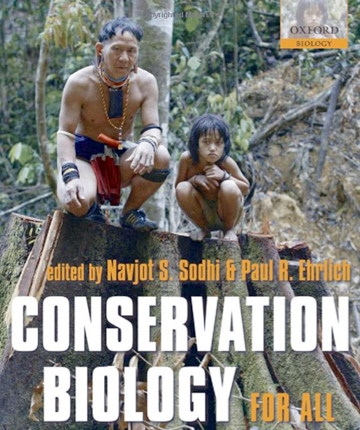|

CONSERVATION BIOLOGY FOR ALL
Free full-text download | Buy print copy
Chapters - free download
Front materials [PDF - 135 KB]
Introduction Navjot S. Sodhi and Paul R. Ehrlich [PDF - 181 KB]
- Conservation biology: past and present Curt Meine [PDF - 268 KB]
- Biodiversity Kevin J. Gaston [PDF - 420 KB]
- Ecosystem functions and services Cagan H. Sekercioglu [PDF - 373 KB]
- Habitat destruction: death by a thousand cuts William F. Laurance [PDF - 643 KB]
- Habitat fragmentation and landscape change Andrew F. Bennett and Denis A. Saunders [PDF - 348 KB]
- Overharvesting Carlos A. Peres [PDF - 273 KB]
- Invasive species Daniel Simberloff [PDF - 1,694 KB]
- Climate change Thomas E. Lovejoy [PDF - 195 KB]
- Fire and biodiversity David M. J. S. Bowman and Brett P. Murphy [PDF - 748 KB]
- Extinctions and the practice of preventing them Stuart L. Pimm and Clinton N. Jenkins [PDF - 352 KB]
- Conservation planning and priorities Thomas Brooks [PDF - 520 KB]
- Endangered species management: the US experience David. S. Wilcove [PDF - 294 KB]
- Conservation in human-modified landscapes Lian Pin Koh and Toby A. Gardner [PDF - 681 KB]
- The roles of people in conservation C. Anne Claus, Kai M. A. Chan, and Terre Satterfield [PDF - 346 KB]
- From conservation theory to practice: crossing the divide Madhu Rao and Joshua Ginsberg [PDF - 470 KB]
- The conservation biologist’s toolbox – principles for the design and analysis
of conservation studies Corey J. A. Bradshaw and Barry W. Brook [PDF - 289 KB]
Free download of the entire text
FULL TEXT
Please do not link directly to the full PDF version from your web site or blog because the url will change periodically.
|
